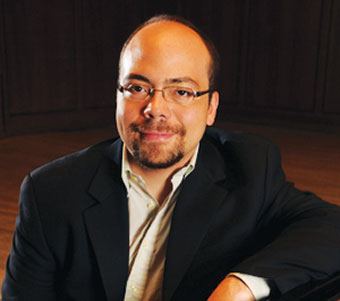At the Keyboard, Hold the Carols
by Jan Jezioro

A December concert without Christmas music
Finding a classical music concert in Western New York in the month of December that is not devoted exclusively to Christmas music is a genuine challenge. While this past Tuesday the venerable Buffalo Chamber Music Society series came through with a fine, non-seasonal performance by the young members of the Jasper String Quartet, there seems to be only one remaining classical music concert without Christmas music during the rest of the month—and, for that matter, well into January.
Luckily for those classical music lovers who need a break from seasonal fare, an ideal respite can be found in the initial concert in the second season of Music in Buffalo’s Historic Places. Eric Huebner, assistant professor of piano at the University at Buffalo and staff pianist for the New York Philharmonic Orchestra, successfully launched his new series last season at the ultramodern Greatbatch Pavilion at the historic Darwin D. Martin Complex on Jewett Parkway. The series returns to the same venue this Sunday, December 15 at 3pm, for a solo recital by pianist Christopher Guzman.
Grand prize winner of the 2012 Orléans piano competition in France, Guzman, an assistant professor of piano at Penn State, is a multiple prize winner in many international competitions, including the Walter M. Naumburg Competition, the Seoul International Music Competition, and the Isang Yun Competition of South Korea. He has appeared in recital in such varied venues as Carnegie’s Weill Hall, Boston’s Jordan Hall, and Spoleto’s Teatro Caio Melisso, as well as appearing as a soloist with several large American orchestras.
When contacted at a Paris airport last Sunday, Guzman was returning home from a month-long French tour. He was enthusiastic about his upcoming Buffalo program, which combines several well-known works with lesser-known works by Hans Werner Henze and Jörg Widmann.
“Beethoven’s Sonata in E-flat Major, ‘quasi una fantasia,’ Op.27 no.1 is an appropriate choice to begin this program,” says Guzman, “as with this sonata we see his first breaking away from the traditions of ‘high classical’ structures. Indeed, the fantasy element is a natural introduction to the Lucy Escott Variations of Henze, which are improvisatory and, as with the Beethoven, are played without pause between the sections.” Among the most popular of Henze’s short works, the Lucy Escott Variations are based on the Bellini aria “Come a me sereno” from La sonnambula (The Sleepwalker) and are an irresistibly hallucinatory homage to the 19th-century American coloratura-soprano Lucy Escott.
“The two Liszt works are meant as a tribute to Wagner,” says Guzman. “The first, Am Grabe Richard Wagners, S. 135 (At Richard Wagner’s Grave) begins in the style of Wagner’s monumental opera Parsifal with quotes from Liszt’s own Excelsior, of which Wagner remarked to Liszt at one point that it reminded him of his own Parsifal. The Am Stillen Herd, S.448 (At the Hearth) transcription from Wagner’s Der Meistersinger is one of the lesser heard of the very many Liszt transcriptions, but it definitely shouldn’t be.”
Guzman will also perform the area premier of the contemporary German composer Jörg Widmann’s recently composed Humoresques, a set of 11 character pieces that refer to Schumann’s work of the same name. The short pieces alternate between that composer’s Romantic tonal language and contemporary tonal language. In his preface to the score, the composer instructs the performer to “discover the specific tone of each of the pieces and make it sound sometimes scornful, sometimes dry, tinged with melancholy, yet always with humor and sensitivity.’
“Jörg Widmann is a fantastic composer and equally great clarinetist,” says Guzman. “He enjoys great popularity worldwide, and though his piano works are just getting airtime as of late, both András Schiff and Yefim Bronfman have played his works in concert…Bronfman actually premiered this work in Carnegie Hall.
“The humor in the humoresques is not necessarily funny. In fact, the only movement that is really meant to have a clear comic element is the ‘Forest Scene.’ Otherwise, the humor can be heard more as levity or volatility or even instability. In this way, and in many other ways, he was thinking of Schumann’s music and life, and I will talk about this during the concert as well.”
The program will conclude with the Four Pieces for Piano, Op. 119 by Johannes Brahms. The final work composed by Brahms for solo piano, the neutral title of intermezzo that the composer gave to the first three of the pieces belies their sometimes poetic content, a quality that reaches fruition in the fourth and final piece, which is a rhapsody.
Tickets are $20 general admission, $15 for members and students. For more information, visit www.darwinmartinhouse.org or call 856-3858.
blog comments powered by Disqus|
Issue Navigation> Issue Index > v12n50 (Week of Thursday, December 12) > At the Keyboard, Hold the Carols This Week's Issue • Artvoice Daily • Artvoice TV • Events Calendar • Classifieds |









 Current Issue
Current Issue